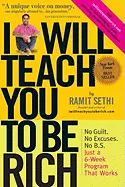
I Will Teach You To Be Rich - by Ramit Sethi
ISBN: 0761147489Date read: 2010-03-23
How strongly I recommend it: 7/10
(See my list of 430+ books, for more.)
Go to the Amazon page for details and reviews.
An amazing book about consumer finance and a healthy approach to managing your money. If you are age 18-35, this is a must-read! My notes are scarce, so get the book. Even if over 35, you might find some good tips on lowering your fees on various services, and a good reminder of good savings practices.
my notes
If you have very good credit, you should call your credit cards and lenders once per year to ask them what advantages you're eligible for. Often, they can waive fees, extend credit, and give you private promotions that others don't have access to.
Call them up and use this line: "Hi there. I just checked my credit and noticed that I have a 750 credit score, which is pretty good. I've been a customer of yours for the last four years, so I'm wondering what special promotions and offers you have for me. I'm thinking of fee waivers and special offers that you use for customer retention."
Trip-cancellation insurance: If you book tickets for a vacation and then get sick and can't travel, your airline will charge you hefty fees to re-book your ticket. Just call your credit card and ask for the trip-cancellation insurance to kick in, and they'll cover those change fees—usually up to $1,000 per year.
If you have no debt, close as many accounts as you want. It won't affect your credit utilization score.
Online banks like ING Direct and Emigrant Direct offer simple banking with great rewards and almost no downsides.
I think of my checking account like an e-mail inbox: All my money goes in my checking account, and then I regularly filter it out to appropriate accounts, like savings and investing, using automatic transfers.
Think of savings accounts as places for short-term (one month) to midterm savings (five years). You want to use your savings account to save up for things like a vacation.
The most important practical difference between checking accounts and savings accounts is that you withdraw money regularly from your checking account - but you should rarely withdraw from your savings account.
For consumer protection, I pay my bills using my credit card.
My ING Direct savings account automatically withdraws a certain amount every month from my checking account, as does my investment account.
All of my money goes through my interest-bearing Schwab online checking account. I use the Schwab ATM card to withdraw money at any ATM nationwide.
I use my ING Direct account as a receiver, not a sender: I rarely transfer money out of there unless I need to cover a temporary shortage in my checking account or want to spend savings money on something important, like a vacation or birthday gift.
Check out your local credit union at http://www.creditunion.coop/cu_locator
Recommended:
Schwab Bank Investor Checking with Schwab One Brokerage Account
ING Direct Orange Savings
Emigrant Direct (https://emigrantdirect.com):
HSBC Direct (www.hsbcdirect.com)
Optimize your checking and savings accounts. You shouldn't be paying fees or minimums.
If I'm lending a bank my money to re-lend out, I don't believe I should have to pay them additional fees.
I'm fanatical about my savings and checking accounts having no fees of any kind, including monthly fees, overdraft fees, or setup fees.
Leave one and a half months of living expenses in your checking account. Transfer the rest to your savings.
Once you've set up your 401(k) and dispelled your debt, it's time to start funding a Roth IRA. A Roth IRA is another type of retirement account with significant tax advantages. It's not employer sponsored—you contribute money on your own. Every person in their twenties should have a Roth IRA, even if you're also contributing to a 401(k). It's simply the best deal I've found for long-term investing.
A Conscious Spending Plan ("I automatically send money to my investment and savings accounts, then just spend the rest")